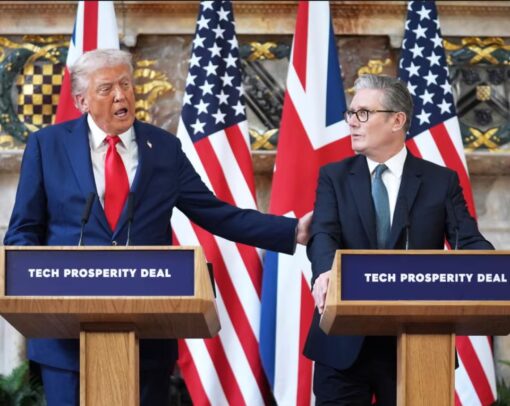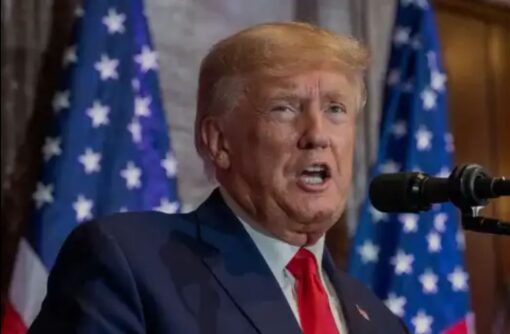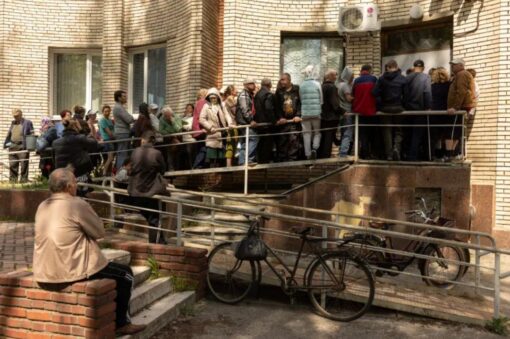The growing entanglement of U.S. politics with Europe’s shifting ideological landscape is once again in focus, as a new report warns that Donald Trump is exporting his brand of culture war politics to empower right-wing allies across the continent.
Analysts say that the Trump culture war Europe nexus is not just rhetoric—it is reshaping policy debates, election campaigns, and even transatlantic relations.
According to the findings, Trump’s return to the global stage, combined with his ambitions for a second term, has emboldened European right-wing leaders who see his movement as a template for their own rise to power.
“There is no doubt that what Trump has created in the United States has had a ripple effect across Europe,” said one Brussels-based political strategist. “We’re now seeing copycat strategies in election messaging, anti-immigration rhetoric, and attacks on so-called liberal elites.”

The report details how Trump’s political playbook—centered on nationalism, skepticism of international institutions, and divisive cultural issues—is being actively borrowed by parties in countries such as Italy, Hungary, Poland, and even France. This trend, researchers argue, is blurring the traditional boundaries between American and European conservatism.
“In Hungary, Viktor Orbán openly praises Trump’s leadership style. In Italy, Giorgia Meloni has drawn from the same themes of family values and anti-LGBTQ+ policies that fuel U.S. debates,” the report highlights.
It also notes that populist movements in Germany, Spain, and the Netherlands have benefited from the aura of legitimacy created by Trump’s continued influence in U.S. politics.
Critics argue that this exported culture war is destabilizing Europe’s democratic norms. “The danger is that Trump provides a powerful model for how to undermine trust in democratic institutions while presenting yourself as the voice of ‘the people’ against elites,” explained Dr. Sophie Lambert, a European politics expert at the University of Amsterdam.
“When you couple that with disinformation campaigns and the amplification of social media, you have a perfect recipe for polarization.”
The report claims Trump has moved beyond inspiration to active collaboration, forging connections with right-wing European leaders and organizations. High-profile visits, closed-door conferences, and transatlantic funding channels are cited as evidence of a more coordinated approach.
“Trump is not just cheering from the sidelines,” said a senior EU diplomat who asked not to be named. “He is actively building bridges with leaders who share his worldview. From Orbán to Marine Le Pen, the encouragement is clear: Trumpism is not confined to America.”
A key focus is immigration—a lightning rod both in U.S. and European debates. Trump’s harsh border policies have resonated with European leaders pushing back against refugee resettlement programs. Italian Prime Minister Giorgia Meloni has spoken favorably of Trump’s border stance, while figures in Poland’s Law and Justice Party have echoed his arguments against migration.
At the heart of the Trump culture war Europe phenomenon is a narrative war. Issues such as gender identity, climate change, and the role of the EU have become battlegrounds where Trump’s influence is evident.
In Germany, the far-right Alternative für Deutschland (AfD) party has echoed Trump’s dismissive stance on climate science, calling climate policies “elitist fantasies.” In France, far-right leader Marine Le Pen has incorporated “anti-woke” themes into her platform, echoing Trump’s attacks on diversity and inclusion programs.
“Trump has given European conservatives a language of resistance,” said Miguel Santos, a Spanish political commentator. “He has shown them that you can mock climate activists, demonize migrants, and ridicule gender debates while gaining popularity. That’s why European leaders are seizing these issues—they see them as vote-winners.”
The report has triggered concern in both Brussels and Washington, with officials warning that such political export could strain transatlantic ties. EU Commission insiders suggest that Trump’s allies in Europe are working against the very foundations of the European Union by promoting nationalist agendas.
“It’s a paradox,” noted one EU policy adviser. “Trump’s allies in Europe talk about sovereignty, but they rely heavily on international networks for funding, strategy, and legitimacy. They claim to be anti-globalist, yet they are part of a global far-right movement.”
Meanwhile, U.S. State Department officials under the Biden administration have expressed unease over the phenomenon, stressing that a Trump-inspired surge of right-wing populism could complicate cooperation on climate, defense, and trade.
Not all Europeans are receptive to Trump’s cultural export. Civil society groups and progressive parties are pushing back, warning that embracing Trump-style politics risks dragging Europe into deeper social division.
“Trump represents the worst of U.S. politics—disrespect for institutions, disdain for minorities, and reckless nationalism,” argued Anna Müller, a Green Party member of the German Bundestag. “If Europe imports this culture war, we risk undermining everything the EU stands for.”
Others caution that the allure of Trump’s model may prove short-lived. “Europe is not America,” said French sociologist Philippe Bernard. “Our histories, our demographics, and our institutions differ. Trump’s message can inspire, yes, but it can also alienate. In countries with strong democratic traditions, the backlash could be severe.”

The report concludes by highlighting upcoming elections in Europe where Trump’s shadow looms large. From Poland’s parliamentary race to the French presidential contest, Trump-inspired rhetoric is expected to shape campaigns. Analysts warn that the outcome could tilt Europe’s balance between liberal democracy and populist nationalism.
As one EU analyst summed it up: “We are entering a period where American politics is no longer an ocean away. Trump’s culture war is Europe’s culture war too.”
For now, the Trump culture war Europe debate underscores the reality that populism travels fast in the digital age. Whether this strengthens or fractures Europe’s political fabric will be determined in the ballot boxes of the coming years.


